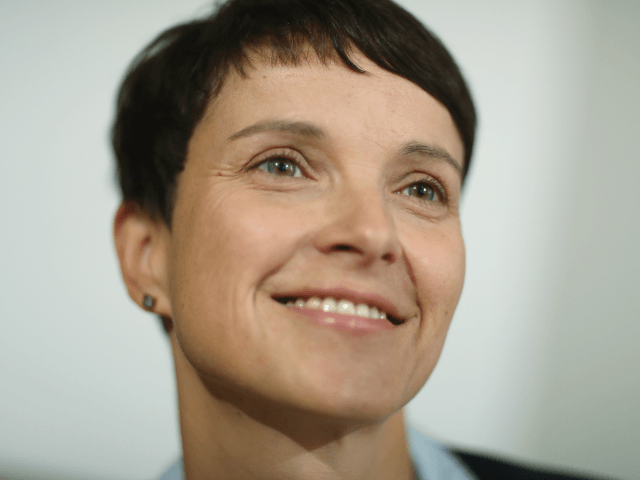The anti-mass migration Alternative for Germany party (AfD) has reached a new record in national polls firmly making them the third largest party in the country.
This surge in support follows the election upset of German Chancellor Angela Merkel’s Christian Democratic Union (CDU) party in Mecklen-Vorpommern, which was pushed into third place by the AfD party led by Frauke Petry (above).
A recent poll conducted by Insa Institute revealed that the AfD, termed the “anti-Merkel party”, has firmly placed itself as the third largest party in the country. Fifteen per cent of Germans now support the populists – a new record for the party which is only three years old, reports Die Welt.
This figure is a 0.5 per cent increase from the week before when the party was neck and neck with the Greens in the polls. Public support for the CDU is continuing its downward trend, having lost several percentage points in the last six weeks alone as Germans across the country have come out against the Chancellor’s migrant policies.
Head of Insa, Hermann Binkert, claimed that the party would not be able to attract the support of more than a fifth of Germans. However, many of the voters for the AfD in last weekend’s election were those who had never voted before, along with former CDU supporters.
Mr. Binkert also claimed that the AfD polling numbers could be a passing trend, predicting that the AfD’s popularity would not increase should the migrant crisis end by the time of the federal election next year.
Jörg Meuthen, federal spokesman for the AfD, was much more optimistic about the numbers, saying that the AfD had finally arrived as a mainstream party that was here to stay and to govern. Highlighting the fact that last year the party had barely 5 per cent of the national vote Mr. Meuthen said, “in one year we have become the people’s party.”
The rise of the AfD in regional elections this year has rocked the establishment of the German political scene, leading to Chancellor Merkel making an impromptu press conference to discuss this weekend’s loss in which she acknowledged her own migrant policies were to blame.
As the popularity of the ruling parties declines due to the migrant crisis, many of Ms. Merkel’s coalition partners have chosen to distance themselves from her, including Vice-Chancellor and Socialist party leader Sigmar Gabriel who criticised Merkel’s “We can do it” sloganeering.
The next test for the AfD will be the regional elections in the German capital later this month where it is expected traditional working class left-wing voters will flock to the party, boosting their vote.

COMMENTS
Please let us know if you're having issues with commenting.